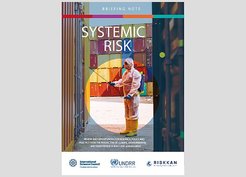Systemic Risk Briefing Note published

Cover of the reports (COVER PHOTO aydinmutlu / istock by Getty Images )
“In a globally highly interconnected world facing ongoing anthropogenic climate change, conflicts, large disparities in prosperity and well-being, and the long-lasting consequences of the COVID-19 pandemic, complex and dynamic systemic risks are the ‘new normal’”. concludes Prof. Markus Reichstein, Director at the Max Planck Institute for Biogeochemistry, Jena, Germany, who co-authored the Briefing Note as chair of the Knowledge Action Network on Emergent Risks and Extreme Events (Risk KAN). He further adds: “This Briefing Note extends our earlier Comment in the journal Nature ‘More floods, fires and cyclones - plan for domino effects on sustainability goals’, and indicates that the solutions need to be systemic as well and embrace many sectors and regions simultaneously (e.g. food, education, infrastructure, financial markets).”
The Briefing Note argues that climate risk assessments and adaptation strategies that focus exclusively on straight-forward and clearly identified risks to individual nations and sectors are insufficient to deal with systemic risks such as climate change or a global pandemic. Only by reducing system vulnerabilities will the world be in a better position to reduce systemic risks. Given the uncertainties and complexity involved in identifying and analysing systemic risks, the authors of the Briefing Note further highlight that no single streamlined approach will capture the complexity of interconnecting, compounding and cascading risks. Instead, the Briefing Note suggests the use of “toolbox approaches” that take an iterative approach to learning, using multiple lines of evidence and a range of methods and perspectives. Moreover, toolbox approaches that are built on an open and inclusive process that includes a broad set of stakeholders can increase trust and buy-in of decision-makers.
Sillmann, J., Christensen, I., Hochrainer-Stigler, S., Huang-Lachmann, J., Juhola, S., Kornhuber, K., Mahecha, M., Mechler, R., Reichstein, M., Ruane, A.C., Schweizer, P.-J. and Williams, S. 2022. ISC-UNDRR-RISK KAN
Briefing note on systemic risk
Paris, France, International Science Council, DOI: 10.24948/2022.01
Contact at MPI for Biogeochemistry
Prof. Dr. Markus Reichstein
E-Mail: mreichstein[at]bgc-jena.mpg.de
Phone: +49 3641 576200
Dr. Dorothea Frank
E-Mail: dfrank[at]bgc-jena.mpg.de
